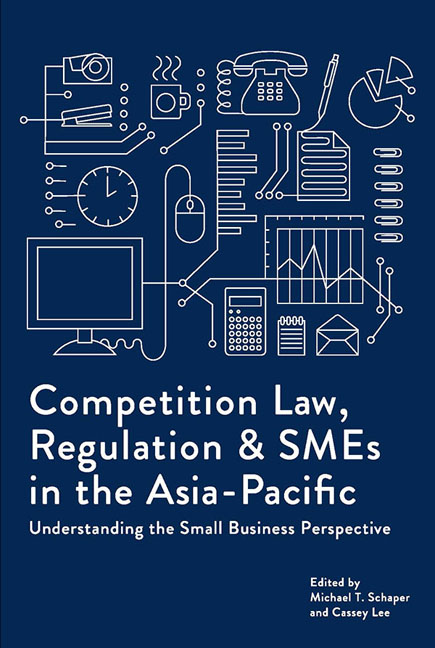 Competition Law, Regulation and SMEs in the Asia-Pacific
Competition Law, Regulation and SMEs in the Asia-Pacific Book contents
- Frontmatter
- Contents
- Foreword
- About the Contributors
- 1 Introduction: Making the Invisible SME More Visible in Competition Policy and Law
- Section 1 Theories And Basic Concepts
- Section 2 Smes And Competition Law
- Section 3 Country Studies
- 12 Competition Law, Regulation, and Trade: Implications for Productivity and Innovation in Singaporean Manufacturing SMEs
- 13 SME Law and Abuse of a Superior Bargaining Position in Japan
- 14 Competition Law, Policy, and Smes in South Korea
- 15 Competition Law Implementation and Smes: Singapore's Experience
- 16 Competition Law and SMEs in Indonesia
- 17 Smes and Malaysia's New Competition Law: Experiences to Date
- 18 Competition Policy and Sme Development in Vietnam
- 19 China's Anti-Monopoly Law and the Sme Sector
- 20 A New Competition Agency Learns to Deal with Smes: The Case of the Hong Kong Competition Commission
- 21 The Regulation of Television Programme Production Contracts under Japan's Subcontract Act
- 22 Small Enterprises and Competition Policy in Pacific Island Countries
- Index
20 - A New Competition Agency Learns to Deal with Smes: The Case of the Hong Kong Competition Commission
from Section 3 - Country Studies
Published online by Cambridge University Press: 05 August 2017
- Frontmatter
- Contents
- Foreword
- About the Contributors
- 1 Introduction: Making the Invisible SME More Visible in Competition Policy and Law
- Section 1 Theories And Basic Concepts
- Section 2 Smes And Competition Law
- Section 3 Country Studies
- 12 Competition Law, Regulation, and Trade: Implications for Productivity and Innovation in Singaporean Manufacturing SMEs
- 13 SME Law and Abuse of a Superior Bargaining Position in Japan
- 14 Competition Law, Policy, and Smes in South Korea
- 15 Competition Law Implementation and Smes: Singapore's Experience
- 16 Competition Law and SMEs in Indonesia
- 17 Smes and Malaysia's New Competition Law: Experiences to Date
- 18 Competition Policy and Sme Development in Vietnam
- 19 China's Anti-Monopoly Law and the Sme Sector
- 20 A New Competition Agency Learns to Deal with Smes: The Case of the Hong Kong Competition Commission
- 21 The Regulation of Television Programme Production Contracts under Japan's Subcontract Act
- 22 Small Enterprises and Competition Policy in Pacific Island Countries
- Index
Summary
This chapter describes the evolution of competition law in recent years in the Hong Kong Special Administrative Region. It discusses the reasons giving rise to the implementation of the Competition Ordinance, its major features, and the reaction of the small business sector to the new law. A number of enforcement actions have already been undertaken by the Hong Kong Competition Commission against small and medium-sized enterprises (SMEs), and it is suggested that a focus on small enterprises is a logical and somewhat predictable step by the new agency.
Introduction
The Hong Kong Special Administrative Region (HKSAR) is a small jurisdiction whose economy is currently in transition from an entrepôt trade to a service-based economy. Since China's accession to the World Trade Organization (WTO) in 2001, Hong Kong's role as an international trade and services centre has increased. The SAR's economy is largely supported by low taxes, an educated workforce, and the rule of law. Major groups in the shipping, logistics, transportation, energy, telecoms, and retail markets have secured dominant positions through massive infrastructure investments and government deals. Yet 98 per cent of Hong Kong companies are small and medium-sized enterprises (SMEs) and serve the local market, which consists of some 7 million people population with a gross domestic product (GDP) per capita comparable to the United Kingdom or Japan. In 2014, Hong Kong's SMEs (defined by the government as a manufacturing business which employs fewer than one hundred persons in Hong Kong; or a nonmanufacturing business which employs fewer than fifty persons in Hong Kong) employed 48 per cent of the local workforce (Trade and Industry Council 2014).
Over the years, businesses have played a significant role in shaping the governance of Hong Kong. In Hong Kong's political system, the Chief Executive is the head of the Executive Council, which comprises of members of government as well as non-official members. The Chief Executive is elected by a 1,200-strong election committee, of which a majority is returned by selective categories of professions. This system favours the business community, as the election committee is heavily influenced by pro-Beijing business people and long-established business interests. Among the Executive Council, a substantial number of people have extensive business experience.
The legislative branch, known as the Legislative Council, consists of a single chamber.
- Type
- Chapter
- Information
- Competition Law, Regulation and SMEs in the Asia-PacificUnderstanding the Small Business Perspective, pp. 345 - 358Publisher: ISEAS–Yusof Ishak InstitutePrint publication year: 2016
